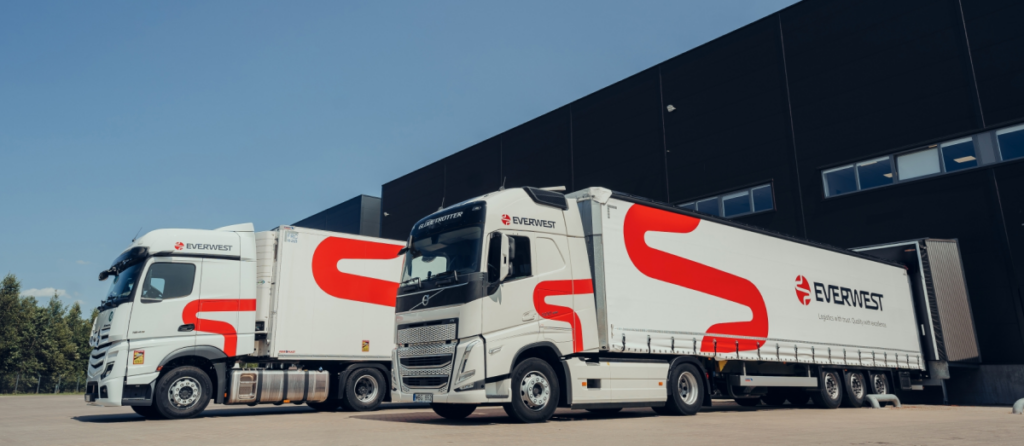Redefining the Silk Road with Modern Logistics
25th April 2025

The historical trade route that connected the civilizations of China and Europe is undergoing a resurgence in importance. Over the past ten years, trade volumes between China and the European Union have grown more than tenfold, collectively exceeding €730 billion last year. China remains the EU’s third-largest trading partner worldwide, and given the geopolitical situation, trade relations between these countries are expected to strengthen further. This has led to significant challenges in logistics management.
Three modes of transport can be used to facilitate logistics: air, sea, and land transportation. Road transport, once a niche player in this high-volume corridor, is rapidly emerging as a strategic imperative for transport and logistics companies seeking agility, speed, and bespoke solutions. The driving force behind this change is the growing demand for speed and flexibility. In an era of rapid technological advancements, just-in-time inventory models, and explosive growth in e-commerce, the lengthy transit times associated with sea freight are becoming untenable for a significant part of the market.
“Road transport is an attractive option, with the potential to reduce delivery times from weeks to days, at the same time it is cheaper compared to air transport, which is a significant benefit for high-value electronics, perishable goods, fashion and urgent shipments. This enhanced agility directly translates into lower inventory holding costs, faster market entry, and improved responsiveness to consumer demand, which are key differentiators in today’s competitive landscape,” says Everwest CEO Pavel Kveten.
Furthermore, the unparalleled last-mile connectivity of road transport provides a logistical elegance that other modes struggle to match. Trucks offer a door-to-door service, eliminating the complexities and potential delays of other modes. This efficient approach enhances cargo security, reduces handling costs, and provides shippers with a single point of contact and greater control over their supply chain. For businesses, particularly SME’s, requiring direct delivery to inland distribution canters or end customers across the EU, road transport offers a level of convenience and efficiency that is increasingly valued.
The ongoing development of infrastructure along the New Silk Road corridors is a critical enabler for this growth. Investments in modern highways, streamlined border crossing procedures facilitated by international frameworks like TIR (Transports Internationaux Routiers), and the establishment of strategic logistics hubs are creating a more efficient and reliable road network. Companies like Everwest Group are strategically leveraging these infrastructure improvements to optimise their routes and minimise transit times. Their investment in modern, well-maintained fleets equipped with advanced tracking technology allows for real-time visibility and proactive management of shipments traversing these evolving arteries of trade.
However, the journey along the China-EU road freight route is far from frictionless. Several significant challenges require careful navigation and strategic mitigation. The sheer distances involved necessitate meticulous planning, efficient route optimisation, and robust driver management protocols to address fatigue and ensure compliance with varying regulations. The complexity and diversity of border regulations and customs procedures across multiple countries require specialised expertise and accurate documentation to avoid costly delays. In response, companies like Everwest are investing in dedicated customs clearance teams and leveraging digital solutions to streamline documentation processes and navigate the intricate regulatory landscape.
In addition, the growing emphasis on environmental sustainability is putting increasing pressure on the road transport sector to adopt greener practices. In response, Everwest is proactively exploring investments in more fuel-efficient vehicles and exploring opportunities for intermodal solutions to minimise its carbon footprint and align with evolving environmental regulations and customer expectations.
In principle, transporting goods by land between China and Europe may appear to be a complex undertaking. This is due to several factors, including border queues, customs procedures in certain countries, political and economic instability, and inadequate road infrastructure development. In addition to these challenges, natural impediments such as snow-blocked roads and sandstorms further compound the situation.
“However, Everwest’s experience and expertise allow it to overcome these challenges. Our approach involves selecting the optimal cargo route using advanced technologies, including AI, and dynamically adjusting routes in real-time based on changing traffic and weather conditions. We also have experience working with official institutions in various countries,” says Kveten.
Recognising the increasing demand for speed and flexibility, the company has strategically invested in building a robust network and expertise in navigating the complexities of this challenging yet promising trade lane.
Similar news
New Silk Road and Trans-Siberian Route Available with Global Provider

